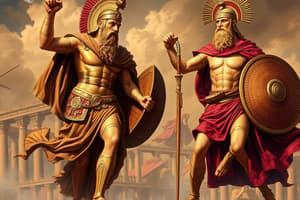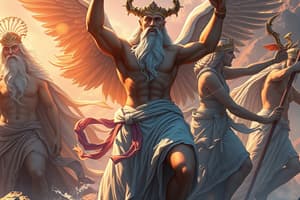Podcast
Questions and Answers
What life lesson does the story of Cronus' reign in Greek mythology teach us?
What life lesson does the story of Cronus' reign in Greek mythology teach us?
- Choices do not determine our destiny
- Power dynamics can lead to a power struggle (correct)
- Freedom is granted without any effort
- Our actions have no consequences
What is emphasized in the story about rebellion and overthrowing tyranny?
What is emphasized in the story about rebellion and overthrowing tyranny?
- Considering the consequences of actions is crucial (correct)
- Absolutism is essential for effective rebellion
- Rebellion always leads to positive outcomes
- The consequences of rebellion are simple and predictable
What insight does Uranus' story provide about power dynamics?
What insight does Uranus' story provide about power dynamics?
- Balance in power dynamics is crucial (correct)
- Power should only be held by one individual
- Absolutism is necessary for maintaining power
- Power dynamics should always be imbalanced
How does the story of Cronus' reign caution against the misuse of power?
How does the story of Cronus' reign caution against the misuse of power?
What does the myth of Cronus overthrowing Uranus teach about power dynamics?
What does the myth of Cronus overthrowing Uranus teach about power dynamics?
How did Uranus respond to his fear of the power of his children in Greek mythology?
How did Uranus respond to his fear of the power of his children in Greek mythology?
What message does Cronus' rebellion against Uranus convey about absolutism?
What message does Cronus' rebellion against Uranus convey about absolutism?
In Greek mythology, what was the catalyst for Cronus' rebellion against Uranus?
In Greek mythology, what was the catalyst for Cronus' rebellion against Uranus?
What distinguishes Kronos and Zeus in terms of their roles and powers?
What distinguishes Kronos and Zeus in terms of their roles and powers?
In Greek mythology, what was the significance of the Titanomachy?
In Greek mythology, what was the significance of the Titanomachy?
What power does Zeus wield and what is his main weapon according to Greek mythology?
What power does Zeus wield and what is his main weapon according to Greek mythology?
What marked Zeus' reign as king of gods and humans in Greek mythology?
What marked Zeus' reign as king of gods and humans in Greek mythology?
Who ultimately overthrew Kronos in the Titanomachy?
Who ultimately overthrew Kronos in the Titanomachy?
What was the significance of Zeus' victory over Kronos in Greek mythology?
What was the significance of Zeus' victory over Kronos in Greek mythology?
How did Kronos' actions towards his children impact his own fate?
How did Kronos' actions towards his children impact his own fate?
What did the banishment or imprisonment of the Titans signify in Greek mythology?
What did the banishment or imprisonment of the Titans signify in Greek mythology?
Flashcards are hidden until you start studying
Study Notes
Unleashing Lessons from Uranus: Mythical Insights on Rebellion, Power, and Consequences
Uranus, the seventh planet from our sun, has captivated the human imagination for centuries. While it's a fascinating celestial body, I'm not discussing its physical or astronomical properties here. Instead, I'm exploring how Uranus' mythological counterpart can offer us valuable life lessons on rebellion, power dynamics, and the consequences of our actions.
Uranus in Greek Mythology
In Greek mythology, Uranus, or Ouranos, was the primordial sky god and the father of the Titans. His wife, Theia, bore him the twelve Olympians, including the sky god Zeus. Uranus, however, feared his children's power and imprisoned them in the depths of the earth.
Rebellion and Power Dynamics
The rebellion against Uranus by Cronus, one of his sons, is a compelling story about the consequences of abusing power and the desire for freedom. Cronus overthrew his father, Uranus, and took the throne of the gods, a symbol of rebellion against tyranny and the assertion of one's right to power.
This myth provides a powerful message: the dangers of absolutism and the importance of balance in power dynamics. When power is abused, it can lead to tyranny and oppression, and the only way to restore harmony is through rebellion.
Consequences of Actions
The consequences of Cronus' rebellion against Uranus are far-reaching. Cronus' reign, while successful in overthrowing his father, was ultimately short-lived, as he was overthrown by his son Zeus, who then established the Olympian rule.
The consequences of Cronus' actions illustrate an essential life lesson: our actions have far-reaching effects, and our choices determine our destiny. In the story, Cronus' misuse of power and rebellion led to a power struggle that eventually resulted in the establishment of a new order.
Lessons for Life
The story of Uranus and his children reminds us that freedom is not granted but must be fought for. The consequences of our actions can be far-reaching, and our choices determine our destiny. It demonstrates the importance of balance in power dynamics and the dangers of absolutism.
The myth also teaches us that rebellion can be a necessary tool for overthrowing tyranny and asserting one's right to power. However, it also emphasizes the importance of considering the consequences of one's actions, as the consequences of rebellion can often be far more complex and far-reaching than initially anticipated.
Uranus' mythical counterpart provides valuable insights into the complexities of power, rebellion, and their consequences. By examining these themes through the lens of Greek mythology, we can better understand the nature of power and our responsibility to use it wisely.
Studying That Suits You
Use AI to generate personalized quizzes and flashcards to suit your learning preferences.




